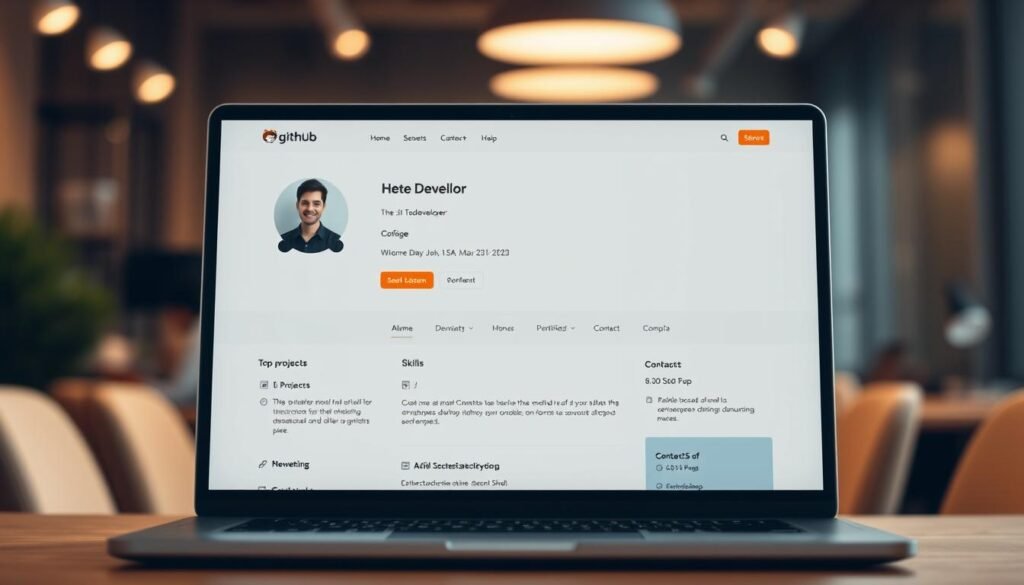Can you build a successful career in software engineering without a traditional computer science degree? The answer is a resounding yes. The tech industry is evolving, and employers are increasingly valuing practical skills over formal education.
With the rise of mobile apps, cloud infrastructure, and AI, the demand for skilled developers is higher than ever. Fields like software engineering focus on problem-solving and creating real-world solutions, making it accessible to anyone with the right training.
Alternative pathways, such as bootcamps, certifications, and self-learning, are proving to be effective. Programs like IBM’s DevOps and Software Engineering Professional Certificate offer a 6-month skills accelerator. Similarly, edX courses and Duke University’s Java Programming Specialization provide excellent learning opportunities.
In this rapidly changing field, lifelong learning is essential. Whether you’re starting out or looking to advance, there are numerous resources to help you succeed in software engineering.
Key Takeaways
- The demand for software engineers is growing in tech-driven industries like AI and cloud computing.
- Practical skills are often prioritized over traditional degrees by employers.
- Bootcamps, certifications, and self-learning are viable alternatives to a computer science degree.
- IBM’s DevOps and Software Engineering Professional Certificate is a valuable 6-month program.
- Lifelong learning is crucial in the ever-evolving field of software engineering.
Introduction to Software Development Without a Degree
Breaking into software engineering doesn’t always require a formal degree. Many professionals have successfully transitioned into this field through alternative paths. Employers today value practical skills and problem-solving abilities over traditional credentials.
Data shows that 42% of developers landed their first job through side projects or freelancing. Another 25% secured roles via referrals. Programs like IBM’s DevOps and Software Engineering Professional Certificate can prepare learners in just six months, proving that structured learning outside of college is effective.
Success stories abound. Coursera and edX alumni, as well as developers like @JoshWComeau on Twitter, have shown that dedication and the right resources can lead to thriving careers. Employers prioritize portfolios on GitHub, technical interview performance, and real-world problem-solving skills.
Key strategies include building a strong portfolio, networking, and gaining hands-on experience. 85% of developers used these methods to stand out in a competitive job market. Whether you’re transitioning from an adjacent role or starting fresh, the path to becoming a software engineer is more accessible than ever.
This article outlines a 6-step roadmap to help you navigate this journey. From learning programming languages to networking, each step is designed to equip you with the skills and experience needed to succeed.
Step 1: Learn a Programming Language
Learning a programming language is the foundation of any successful tech career. It’s the first skill you’ll need to build applications, solve problems, and create innovative solutions. With so many options available, choosing the right one can feel overwhelming. However, focusing on your goals can make the decision easier.
Choosing the Right Language for Your Goals
Different programming languages serve different purposes. Python is ideal for beginners due to its simplicity and versatility. It’s widely used in data science and automation. Java, on the other hand, is a powerhouse for enterprise-level applications. If you’re interested in web development, JavaScript is essential for creating interactive websites.
For those targeting specific platforms, Swift is the go-to for iOS development, while C++ is perfect for system programming. Aligning your choice with your career aspirations ensures you’re learning skills that matter.
Resources for Learning Programming
There are countless resources to help you get started. Platforms like edX offer beginner-friendly Python courses, while IBM provides structured programs for mastering Java. Duke University’s Java Programming Specialization is a great option, taking just four weeks to complete.
Free resources like Codecademy, freeCodeCamp, and LeetCode are excellent for practice and skill-building. The key is to focus on mastering one or two languages before branching out. This approach ensures depth of knowledge and practical expertise.
Step 2: Master Data Structures and Algorithms
Mastering data structures and algorithms is a critical step in advancing your technical skills. These concepts are the foundation of efficient problem-solving and are essential for acing technical interviews.
Understanding how data structures work can optimize real-world applications. For example, hash tables are used in Uber’s ride-matching system to quickly retrieve driver and rider data. Similarly, sorting algorithms power e-commerce recommendation systems, ensuring users see relevant products.
To build a strong foundation, consider MIT’s OpenCourseWare. Their free resources cover the basics of algorithms and provide a structured learning path. Amazon, for instance, evaluates candidates on their ability to optimize algorithms, making this knowledge crucial for interviews.
Practice is key. Platforms like LeetCode host over 2,000 interview questions to help you sharpen your skills. Daily challenges and pair programming can also enhance your understanding and speed. By mastering these concepts, you’ll be well-prepared to tackle complex coding problems.
Step 3: Build a Portfolio on GitHub
Your GitHub profile can be your ticket to landing a tech job. Employers often review GitHub activity metrics to assess a developer’s skills. A well-organized portfolio demonstrates your ability to write clean, functional code and collaborate on projects.
Creating an Impressive GitHub Profile
Start by organizing your repositories with clear naming conventions and detailed README files. These files should explain the purpose of each project, the technologies used, and how to run the code. Tools like GitHub Pages can host live demos, while GitHub Actions can automate testing and deployment pipelines.
Contributing to Open-Source Projects
Open-source contributions are a great way to showcase your skills. Participate in events like Hacktoberfest to gain visibility. For example, @McKayla’s Rust/WebAssembly emulator attracted startup offers due to her documented contributions. Highlighting these projects in your portfolio can set you apart from other candidates.
Step 4: Prepare for Coding Interviews
Coding interviews are a critical step in securing a tech role. These interviews test your technical skills and problem-solving abilities. To succeed, you need to understand the different types of interviews: whiteboarding, system design, and behavioral.
Whiteboarding challenges your ability to solve problems on the spot. System design evaluates your capacity to architect scalable solutions. Behavioral interviews assess how well you fit into a team. Each type requires specific preparation and practice.
Mock interviews can significantly improve your performance. Platforms like Pramp offer free peer-to-peer mock interviews, helping you gain confidence. Data shows that mock interviews improve success rates by 40%.
Time management is crucial. Aim to solve Medium-level problems in under 25 minutes. This skill is essential for impressing employers during timed assessments.
Consider IBM’s interview prep course, which provides real engineer feedback. Stories like @HoracioDurán’s, who learned PHP in 72 hours to pass a technical test, show that dedication and the right resources can lead to success.
By focusing on these strategies, you’ll be well-prepared to excel in coding interviews and secure your desired role.
Step 5: Gain Practical Experience
Gaining hands-on experience is a game-changer in the tech industry. Employers value candidates who can demonstrate real-world skills. Whether through internships, freelancing, or personal projects, practical knowledge sets you apart.
Internships and Entry-Level Roles
Internships are a great way to build experience and gain exposure to real-world applications. Programs like IBM’s project-based internships offer structured learning opportunities. Entry-level roles, such as QA testers or technical support specialists, provide a solid foundation for growth.
These positions often come with mentorship and training, helping you develop essential skills. For example, @GennaMatson transitioned from direct mail to email tech development through an entry-level role. Such stories highlight the importance of starting small and growing your expertise.
Freelancing and Personal Projects
Freelancing is another effective way to gain work experience. Platforms like Upwork and Toptal connect you with clients needing tech solutions. 42% of developers started their careers through freelance gigs, proving its viability.
Personal projects also showcase your skills. Contributing to open-source initiatives like Google Summer of Code can boost your visibility. @Brenton’s journey from freelancing to a full-time role demonstrates the power of building a diverse portfolio.
By combining internships, freelancing, and personal projects, you can create a strong foundation of practical experience. This approach not only enhances your skills but also makes you a competitive candidate in the tech job market.
Step 6: Network and Seek Referrals
Building meaningful connections can significantly boost your tech career. Networking opens doors to opportunities that might not be advertised publicly. Studies show that 25% of hires come from referrals, making it a powerful tool for landing your dream job.
Start by engaging with professionals on LinkedIn. Join local meetups for Python or JavaScript enthusiasts. These events can triple your chances of getting interviews. For example, @Kara found mentorship through @learningcode volunteer work, which helped her transition into a tech role.
When requesting referrals, use a clear and professional template. Try: “I admire [Company]’s work on [Project] and would love to contribute my skills.” This approach shows genuine interest and increases your chances of a positive response.
Online communities like freeCodeCamp and CodeNewbie on Discord are excellent for building connections. These platforms offer support, resources, and collaboration opportunities. @Brennen’s success in the Toronto tech community highlights the value of active participation.
By combining networking, mentorship, and community engagement, you can create a strong foundation for your tech career. These strategies not only enhance your skills but also expand your professional opportunities.
Conclusion: Start Your Journey Today
Starting your journey in tech is easier than you think, even without a traditional degree. With the right tools and mindset, you can build a successful career software path. Platforms like GitHub, LeetCode, and Coursera Plus subscriptions are essential for skill-building and showcasing your work.
Take action today by joining the #100DaysOfCode challenge and building at least three portfolio projects. Stories like @QueenArit’s, who transitioned from biology to tech blogging, prove that dedication leads to success. Use resources like freeCodeCamp’s curriculum and CS50 courses to accelerate your learning.
Your first pull request is closer than you think. Start coding tonight and take the first step toward becoming an engineer without degree. The tech industry is waiting for your contributions—start today and make your mark.
FAQ
Can I work as a software engineer without a computer science degree?
Yes, many employers value skills and experience over formal education. Building a strong portfolio, mastering technical skills, and gaining practical experience can help you land a role in software engineering.
What programming languages should I learn first?
Start with languages like Python, JavaScript, or Java, depending on your career goals. Python is great for beginners, while JavaScript is essential for web development.
How important are data structures and algorithms for software engineering?
They are crucial for solving complex problems and performing well in coding interviews. Mastering these concepts will improve your efficiency and problem-solving skills.
How can I build a strong portfolio without professional experience?
Work on personal projects, contribute to open-source platforms like GitHub, and create applications that showcase your skills. A well-documented portfolio can impress potential employers.
What are the best resources for learning programming?
Online courses from platforms like Coursera, Udemy, and freeCodeCamp are excellent. Books, coding boot camps, and tutorials can also help you develop technical skills.
How can I prepare for coding interviews?
Practice solving problems on platforms like LeetCode and HackerRank. Focus on data structures, algorithms, and time management to excel in technical interviews.
Is networking important for landing a software engineering job?
Yes, networking can open doors to referrals and job opportunities. Attend industry events, join online communities, and connect with professionals on LinkedIn.
Can freelancing help me gain experience in software engineering?
Absolutely. Freelancing allows you to work on real-world projects, build your portfolio, and develop client management skills, all of which are valuable for your career.
How long does it take to become a software engineer without a degree?
It varies based on your dedication and learning pace. With consistent effort, many people transition into the field within 6 to 12 months.
What roles can I start with as a beginner in software engineering?
Entry-level roles like junior developer, intern, or web developer are great starting points. These positions provide hands-on experience and help you grow in the field.









